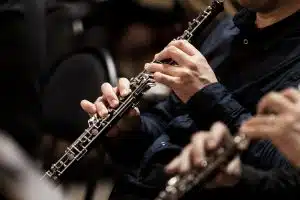Music Schools In The US
Music schools in the US offer some of the best education and training for aspiring musicians, with a range of programs and resources that cater to different interests and levels of expertise. From conservatories and universities to private institutions, there are plenty of options for students who want to pursue a career in music or simply improve their skills as a hobby. In this essay, we will explore the different types of music schools in the US, their benefits, and their role in shaping the music industry.
Types of music schools
First, let’s look at the various types of music schools available in the US. One of the most well-known types is the conservatory, which is a specialized school that focuses solely on music education. Conservatories offer intensive training in classical music, and students typically spend the majority of their time practicing their instrument or voice.
The Juilliard School, located in New York City, is perhaps the most famous conservatory in the country, with a rigorous curriculum that prepares students for professional careers in music.
Another type of music school is the university, which offers a more diverse curriculum that includes music theory, history, and composition in addition to performance. Universities often have multiple departments or colleges that offer music programs, and students can choose from a range of majors and minors that suit their interests.
Some of the top universities for music in the US include the Eastman School of Music at the University of Rochester, the Berklee College of Music in Boston, and the Thornton School of Music at the University of Southern California.
Private institutions are also popular among music students, as they offer specialized training in specific areas of music, such as jazz, rock, or film scoring. The Musicians Institute in Hollywood, California, is an example of a private institution that provides comprehensive training in contemporary music genres. Other private schools include the New England Conservatory of Music and the Manhattan School of Music.
The benefit
Music schools in the US offer several benefits to students, including access to world-class faculty, state-of-the-art facilities, and performance opportunities. Many schools also have partnerships with professional orchestras, opera companies, and other music organizations, providing students with valuable networking opportunities and potential job prospects. In addition, music schools often have a strong sense of community, with students and faculty members collaborating and supporting each other in their musical endeavors.
The role of music schools in shaping the music industry cannot be overstated. Many of the most successful musicians in the world today, from Jessie J to Lady Gaga, have attended music schools. These institutions have produced countless graduates who have gone on to become renowned performers, composers, conductors, and educators.
Music schools also play a crucial role in preserving and advancing the art of music by training the next generation of musicians and fostering innovation in the field.
Music schools offer a wide range of programs and resources for aspiring musicians, from conservatories and universities to private institutions. These schools provide intensive training, a diverse curriculum, and valuable networking opportunities, and they have a significant impact on the music industry by producing some of the world’s most talented musicians.
Whether you want to pursue a professional career in music or simply improve your skills, a music school in the US can provide you with the education and resources you need to succeed.
What are the top music schools in the US?
Now let’s take a look at the top music schools in the US. The schools in this ranking were selected on the basis of educational excellence, the strength of faculty, reputation, and record of accomplishment by alumni/ae.
Juilliard School
(New York, New York)
The Juilliard School, which was established in 1905, is without a doubt the most prestigious music conservatory in the nation—and for good reason. Juilliard, a music school in New York City‘s Lincoln Center that is renowned for its high standards, has produced numerous artists who have gained notoriety, including Miles Davis, Yo Yo Ma, and Renée Fleming.
The institution provides various combinations of the Bachelor of Music, Master of Music, and Doctor of Music Arts degrees.
A live audition is necessary for admission, which is quite competitive. Only approximately 5% of vocalists and 16% of instrumental musicians are approved each year. Of Juilliard’s 650 students, about 600 are music majors (there is also a dramatic arts program). The tiny size of the school makes it easy for it to draw in top talent. Musicians at Juilliard are typically competitive students who thrive as soloists or as part of elite ensembles.
It is necessary for first-year students to live in student accommodation, practically all of which is conveniently situated near the Lincoln Center neighborhood. Although Juilliard has drawn some criticism for the lack of practice spaces it offers, the school is currently building more on its campus and in its living halls.
Curtis Institute of Music
(Philadelphia, Pennsylvania)
The Curtis Institute of Music, situated in Philadelphia, was established in 1924 and has produced a number of prominent alumni, including composers like Leonard Bernstein, Gian Carlo Menotti, Ned Rorem, and Nino Rota. Some notable former students include pianist Lang Lang, violinist Jascha Brodsky, organist Alan Morrison, and conductors Jaime Laredo and Alan Gilbert.
Curtis is one of the most exclusive music schools in the US. About four to eleven percent of applicants are approved each year, and live auditions are necessary. The total undergraduate enrollment often varies between 150 and 200 students, all of whom are awarded full scholarships (though housing costs are not included).
Students’ entry into musical careers appears to be facilitated by Curtis’ demanding music curriculum. The four campus ensembles, all of which are directed by distinguished teachers, are open to participation from students.
Graduates in vocal performance have gone on to perform at the Met, La Scala, and other well-known opera companies while musicians from Curtis today hold key positions in every significant American symphony.
Manhattan School of Music
(New York, New York)
The Manhattan School of Music, which is situated on Manhattan’s Upper West Side, is a competitive setting that provides its students with a variety of beneficial options. The 1917-founded conservatory is well-known for its jazz program, which has produced a lengthy list of accomplished alumni, including Herbie Hancock, Hugh Masekela, Harry Connick, Jr., and Herbie Mann.
The conservatory offers more than simply jazz, though. The New York City Philharmonic, the Metropolitan Opera, and the Lincoln Center Jazz Orchestra all have members on the Manhattan School of Music faculty who oversee the school’s top-notch programs.
All students receive classes in performance arts, music theory, and music history. Among the popular degrees offered are the Doctor of Music Arts and the Master of Music in Orchestra Performance, Jazz Arts, and Classical Studies.
Moderate selection is used at the school itself. Only 40% of candidates are accepted to join the 400 undergraduate students. About 55% of all students get financial help, and first-year students are expected to reside in student housing.
Berklee College of Music
(Boston, Massachusetts)
Berklee is firmly oriented on the study and practice of current, as opposed to classical, music, unlike many of the institutions on this list. One of the first music schools in the US to teach jazz. Berklee consistently ranks among the top 10 conservatories in the United States.
One of the biggest universities on this list is Berklee, which has 4,131 students. The most well-liked courses offered there include those in songwriting, general music performance, music administration, music teacher education, and music therapy. It also provides students the option of certificates, Bachelor’s degrees, and Master’s degrees in a variety of various disciplines.
The “world’s greatest learning lab for the music of today—and tomorrow” is what Berklee bills itself as.
Quincy Jones, the supreme composer/producer, legendary jazz pianist Keith Jarrett, film composer Howard Shore, and countless Grammy, Oscar, and Tony winners are just a few of the College’s many outstanding alumni.
Mannes College-The New School for Music
(New York, New York)
Mannes College, which was established in 1916, joined The New School for Music’s consortium in 1989. Since then, it has established itself as a leading option for motivated young musicians. Mannes Conservatory, which has 350 students and is located in New York’s Greenwich Village, is one of the smallest conservatories on this list.
The departments of classical music performance, singing, composition, jazz, and more provide both undergraduate and graduate degrees. The prestigious faculty at Mannes comprises a number of well-known composers as well as former and present Metropolitan Opera and New York Philharmonic musicians.
Which schools have doctorates in music?
If a doctorate degree is what you’re aiming for, here are the top music schools in the US. There are several schools in the US that offer doctorates in music, including:
- The Juilliard School – Doctor of Musical Arts (DMA) in Composition, Conducting, and Historical Performance
- Yale School of Music – Doctor of Musical Arts (DMA) in Composition, Conducting, and Performance
- University of Michigan School of Music, Theatre & Dance – Doctor of Musical Arts (DMA) in Composition, Conducting, Music Education, and Performance
- Eastman School of Music at the University of Rochester – Doctor of Musical Arts (DMA) in Composition, Conducting, and Performance
- Indiana University Jacobs School of Music – Doctor of Music (DM) in Composition, Music Education, and Performance
- New England Conservatory of Music – Doctor of Musical Arts (DMA) in Composition, Music Education, and Performance
- University of Southern California Thornton School of Music – Doctor of Musical Arts (DMA) in Composition, Conducting, and Performance
These are just a few examples, and there are many other schools in the US that offer doctoral programs in music. It’s important to research each school’s specific program requirements and faculty expertise to determine which program is the best fit for your interests and career goals.
Getting into music school with AdmissionSight
Admission to a top-tier college or university is a highly competitive and complex process that requires a lot of effort and careful planning. Many students find it overwhelming and confusing to navigate the application process, especially with so much at stake.
This is where AdmissionSight comes in – they are experts in college admissions who can guide you through every step of the process and help you maximize your chances of getting into the top music schools in the US. Here are some reasons why you should seek help from AdmissionSight with college admissions:
- Expert guidance: AdmissionSight has a team of experienced college admissions experts who can provide you with personalized guidance and support. They have a deep understanding of the admissions process and can help you create a strong application that showcases your unique strengths and accomplishments.
- Maximizing your chances: With the help of AdmissionSight, you can develop a strategic approach to your college applications that can significantly increase your chances of getting accepted to your top-choice schools. They can help you identify the best-fit colleges, craft a compelling application, and prepare for interviews and other components of the admissions process.
- Saving time and reducing stress: The college admissions process can be incredibly time-consuming and stressful, especially if you are applying to multiple schools. AdmissionSight can help you streamline the process, so you can focus on your academics and other important activities.
- Access to resources: AdmissionSight has access to a wide range of resources, including data on admissions trends, insider knowledge on admissions committees, and test preparation materials. They can help you leverage these resources to your advantage and ensure that you are fully prepared for the admissions process.
Overall, seeking help from AdmissionSight with college admissions can give you a competitive edge and help you achieve your goals. Book an initial consultation today, free of charge!











































